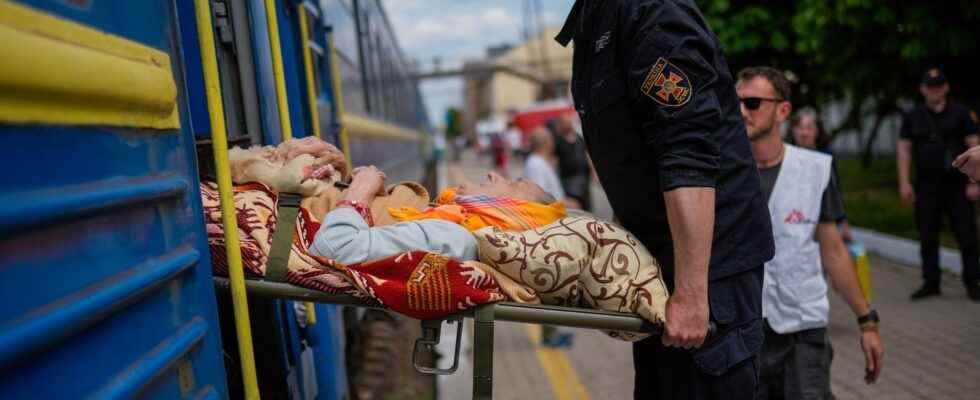full screen
Next
An elderly patient is carried aboard the MSF evacuation train in Pokrosvk, eastern Ukraine, on 29 May. The capacity of the local health service is stretched to the breaking point due to the war.
1 of 2Photo: Francisco Seco / AP / TT
After months of war, the water in the city of Mariupol is polluted by sewage and rotting bodies and authorities warn of outbreaks of cholera and dysentery. Concerns are growing about a long health crisis in Ukraine.
– We need to scale up the international relief efforts, says Gustavo Fernández from Doctors Without Borders.
“Mass burials and poor access to clean water have led to a critical situation in Russian-occupied Mariupol,” Ukraine’s Deputy Health Minister Ihor Kuzin was quoted as saying by the Kyiv Independent newspaper this week. The ministry began registering suspected cases of cholera in the region on June 1.
“The city is literally drowning in garbage and wastewater,” warns the city council on social media.
Mariupol, described by residents during the war as “hell on earth”, is particularly hard hit after months of Russian siege and attacks that, according to Ukraine, destroyed 90 percent of the buildings. Healthcare is probably already on the verge of collapse, writes the British Ministry of Defense in Friday’s intelligence report.
As early as 1995, Ukraine was hit by a major cholera outbreak that hit the shores of the Sea of Azov, where Mariupol is located, particularly hard.
In Kherson in the south, at the same time, the lack of medicine is feared to be critical, according to the British report.
Psychological first aid
The low vaccination rate in Ukraine means that diseases such as measles and polio are at risk of spreading when there is a lack of access to functioning housing, clean water, fuel and medicines. The World Health Organization (WHO) has warned that the war threatens the health of the Ukrainian people, both in the short and long term.
At the same time, the need for psychological first aid in the country is increasing, as many have suffered severe trauma during the war, Doctors Without Borders (MSF) testifies.
Gustavo Fernández is acting medical coordinator for MSF and is located in Dnipro, near the Donetsk region where Russia is conducting its offensive. From here, the work is organized near the front line, together with the local care and volunteers.
A large part of the work consists of easing the burden on local care in smaller rural communities, which have not been evacuated.
– In these areas, which are often under constant shelling, the capacity of civilian care is rapidly declining because they are also forced to take care of injured soldiers, he says.
By contributing medicines, healthcare equipment, clean water and electricity, healthcare facilities can continue to function and people’s basic conditions can be improved, so that disease outbreaks can be prevented.
Elderly people get sick
Many of the population in sparsely populated areas in eastern Ukraine are older. Fernández talks about the situation in Siversk, a city near the front in the Donetsk region that before the war had about 11,000 inhabitants.
– The city bears clear traces of bombing of civilian infrastructure – it is almost a ghost town. People live underground, in extremely difficult conditions. They live in overcrowded, dark corridors where basic opportunities for hygiene, medicine and food are lacking. About 50 elderly people are stuck in the hospital’s basement and are completely dependent on the help of volunteers, he says.
Only one nurse and one doctor remain. About 5,000 people around Siversk live in similar circumstances, Fernández estimates.
– The risk of diarrhea and respiratory diseases is enormous – it is only a matter of time before people living in such circumstances are affected. These communities need help.
The lack of medication for common, chronic ailments quickly becomes life-threatening for the elderly.
– We saw a woman in her 70s who was bedridden, dehydrated and without her heart medicine. There was no one around her who could help her.
“Devastating health impact”
Fernández is also worried about the psychological effects of the war.
– The impact on mental health means that there is a huge risk of depression. We must take this into account as well.
The impact of the war on the health of the Ukrainian people is devastating, he believes.
– Their ability to escape is undermined because civilian lives are not respected. International and local aid is difficult to reach because of the risks – we can not reach people. At the same time, there are huge movements of the population, which affects mental health.
The help resources that are in place are not enough to cover the needs, he believes.
– The outside world must be formally involved. We need to collectively scale up the efforts to provide more help to civilians who are at the front line, says Gustavo Fernández.
Facts
Public health in Ukraine
Poverty and social insecurity have long had negative consequences for public health in Ukraine. With the corona pandemic 2020 came a new health crisis. The vaccination rate against covid-19 is low: only a third were double-vaccinated in the winter of 2022.
At the outbreak of the war, there were plenty of care facilities and sickbeds in terms of population size. At the same time, there was a shortage of medicines and other equipment, and there were demands for bribes from medical staff.
In 2020, tuberculosis infection was registered in close to 18,000 patients, many of whom were resistant to antibiotics. Ukraine also has the most cases of HIV in Europe. Few are vaccinated against diphtheria, pertussis and tetanus, and mistrust of the vaccine is widespread. Outbreaks of polio and measles have occurred in recent years.
Addiction is a common problem in the country.
After three months of war, the WHO confirmed in our 256 attacks in which health facilities were attacked by Russian forces, resulting in 75 deaths.
Source: Landguiden
Read more
